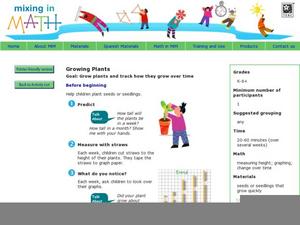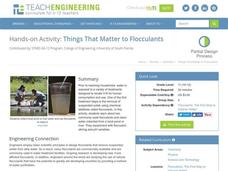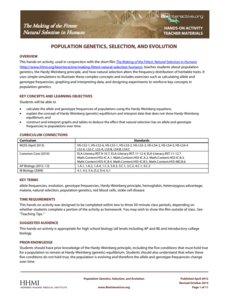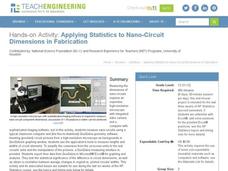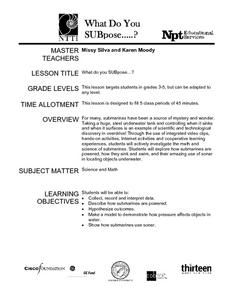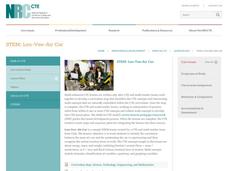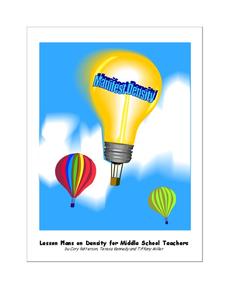North Carolina State University
Exploring Genetics Across the Middle School Science and Math Curricula
Where is a geneticist's favorite place to swim? A gene pool. Young geneticists complete hands-on activities, experiments, and real-world problem solving throughout the unit. With extra focus on dominant and recessive genes, Punnett...
Mixing In Math
Mixing in Math: Growing Plants
Whether you have your class plant seeds or begin when sprouts are visible, math skills are used here to predict and track growth over time. Straw bar graphs show plant height on a given day while the graph as a whole shows changes over...
NASA
Lights on the International Space Station
Groups explore illumination with NASA's Lighting Environment Test Facility (LETF) as a context. Using the TI-Nspire app, groups determine the lux equation that models their simulation. They then use the lux equation to...
Curated OER
TE Activity: Bubbling Plants
Students study a way to quantify the process of photosynthesis during a given time using the Elodea plant. They design a hypothesis that they test in the hands on activity. They compare the amounts of photosynthesis that occur during low...
Agriculture in the Classroom
Pumpkins... Not Just For Halloween
Celebrate fall with four pumpkin themed hands-on activities! After learning about pumpkins, scholars complete two activity sheets that reinforce estimation and word problems. They then plant pumpkin seeds and bake a pie in...
Curated OER
Earthquakes: First Grade Lesson Plans and Activities
First graders explore how earthquakes release energy in a set of hands-on activities. During the pre-lab, they discover how energy from an earthquake releases waves through the earth using a water-filled cup and...
Curated OER
Earthquakes: Second Grade Lesson Plans and Activities
What causes earthquakes? Second graders learn about stresses from plate movement with a set of hands-on activities. After tracing fault lines on a map with yarn, class members create a paper plate model of Earth to show its layers...
Voyage Solar System
Round and Round We Go — Exploring Orbits in the Solar System
Math and science come together in this cross-curricular astronomy lesson plan on planetary motion. Starting off with a hands-on activity that engages the class in exploring the geometry of circles and ellipses, this lesson...
Teach Engineering
Things That Matter to Flocculants
How does the dirt get out of your drinking water? A hands-on activity introduces the use of flocculants to help clear solid particles out of water. The plan walks learners through the process of setting up an experiment that...
Howard Hughes Medical Institute
Population Genetics, Selection, and Evolution
The Hardy-Weinberg principle states that alleles and genotypes remain constant in the absence of evolutionary influences. Scholars complete a simple hands-on activity applying the Hardy-Weinberg principle to sample data. They observe how...
Teach Engineering
Applying Statistics to Nano-Circuit Dimensions in Fabrication
Do flexible circuits change dimensions during fabrication? Groups use GeoGebra software to measure the length of pictures of flexible nano-circuits. To determine if the circuits change dimensions, future engineers use Microsoft...
Space Awareness
Navigation in the Ancient Mediterranean and Beyond
Ancient texts, like Homer's Odyssey, mentions navigating ships by observing constellations. Pupils learn about the link between history and astronomy as they relate to navigation in the Bronze Age. Scholars complete two hands-on...
Howard Hughes Medical Institute
Seed Dispersal in Tropical Forests
How do seeds get around? It's not like plants can control seed dispersal—or can they? Dig deeper into the amazing mechanisms of seed dispersal observed in tropical plants through interactives, a video, and plenty of hands-on data...
Curated OER
What Do You SUBpose?
Submarines are the fous of this math and science lesson. In it, learners explore the world of submarines: how they work, and what they are used for. They engage in hands-on activities, watch video clips, and work in cooperative groups in...
National Research Center for Career and Technical Education
STEM: Lou-Vee Air Car
A comprehensive lesson plan on acceleration awaits your physicists and engineers! Two YouTube videos pique their interest, then sample F=ma problems are worked and graphed. The highlight of the lesson plan is the building of a Lou-Vee...
Baylor College
Finding the Carbon in Sugar
In session one, demonstrate for your class how a flame eventually goes out when enclosed in a jar in order to teach that oxygen is required for combustion. In session two, class members then burn sugar in a spoon to observe how it...
Teach Engineering
Processes on Complex Networks
Introduces your class to random processes in networks with an activity that uses information about disease spread using the susceptible, infectious, resistant (SIR) model. Participants determine whether a susceptible person becomes...
University of Southern Indiana
Manifest Density
There's a lot content packed into the four lessons of this physical science unit on density. From salad dressing to the water cycle and hot air balloons, these lessons engage students in hands-on activities that explore real-world...
Curated OER
The Human Body
Explore the human body through hands-on activities. Young learners will trace their bodies and place cut out body organs in the proper place, print patterns using cut fruit, sing songs about good nutrition, and use their five senses...
Teach Engineering
Designing a Spectroscopy Mission
In this mind-bending activity, young engineers explore this question of whether or not light actually bends. Using holographic diffraction gratings, groups design and build a spectrograph. The groups then move on research a problem...
Curated OER
Plate Tectonics: Third Grade Lesson Plans and Activities
Third graders examine plate movements and boundaries with a lab that demonstrates how volcanoes and earthquakes are formed. It presents different types of stresses an object can withstand through a hands-on...
Institute of Electrical and Electronics Engineers
Sugar Crystal Challenge
Blow your learners' minds with a sweet instructional activity on nanotechnology that uses sugar to demonstrate the difference nanoscale surface area makes in dissolving and crystal formation. Plenty of supportive background information...
Curated OER
X-ray Spectroscopy and the Chemistry of Supernova Remnants
This link takes you to a comprehensive unit that delves into emission spectra and supernovas. There are four parts: How and where elements are created, electromagnetic radiation, spectroscopy, and the newest technology for studying our...
Curated OER
Fish and Clips
Youngsters test magnetic strength by measuring the mass of paper clips that they "hook" with a magnet. Your first and second graders should love the hands-on activities associated with this plan. The reproducible materials are quite good...

